Redditor's Dog Gets Food Coma After Gobbling Banana Bread That Was Left Unattended, Redditor Blames Kids For It
Particularly, retrievers are well recognized for their adolescent love of chewing, as well as their lifelong affection for holding objects in their mouths. After all, carrying things back, or retrieving them, is what they were designed to accomplish.
Your family needs to restrict your dog's access to the objects you don't want chewed in order to stop the chewing. While doing that, provide your dog with a wide variety of chew toys to satiate this beneficial, natural behavior, and work on rewarding your dog for choosing the appropriate objects to chew on.
To temper his youthful exuberance, you should ensure your dog gets at least half an hour's worth of vigorous daily exercise. There have never been more options for chew toys, and your veterinarian can give you advice on which ones are safe and healthy.
The OP in today's story shared an account of how their black lab snuck into the kitchen, where he was not supposed to go, and ate half a loaf of unattended banana bread. This happened after the OP's teenage kids had toasted and buttered some banana bread as an after-dinner sweet treat, and as usual, they left everything on the kitchen bench.
So the dog had direct access and ate to its fill. The OP tried to express his views but ended up getting shunned.
Read the entire story for yourself below.
The Title

It all happened while the OP's family was having a great old family chat post-dinner

There is a bit of the OP hoping the pooch doesn’t need a stomach pump
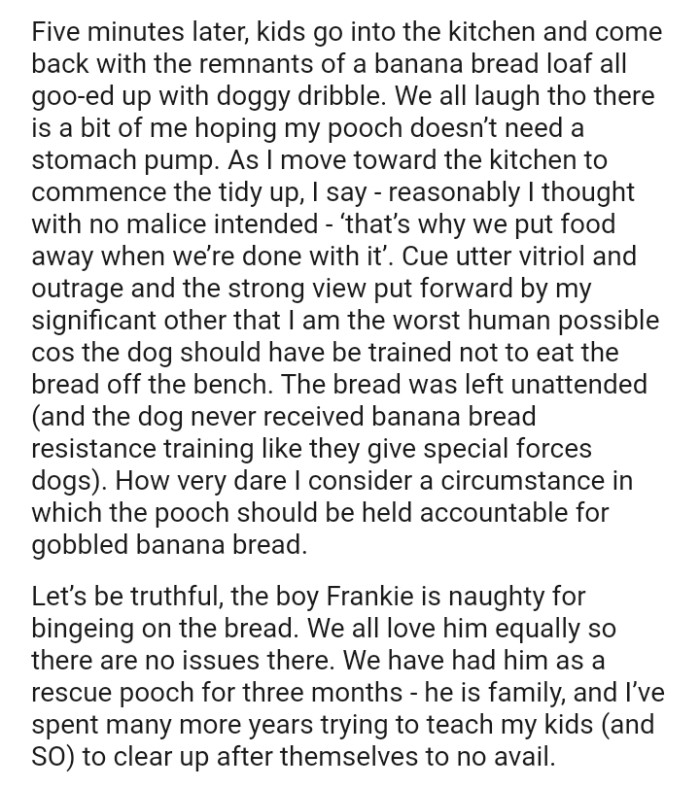
Understanding Animal Behavior
Dr. Julia Reynolds, a behavioral psychologist at the University of Minnesota, explains that dogs often exhibit behaviors like food hoarding or overeating in response to environmental cues. This can be particularly evident when they encounter food left unattended.
Such behaviors are rooted in instinctual survival mechanisms, where animals learn to take advantage of available resources when they arise.
Understanding Pet Behavior and Human Responsibility
The situation surrounding the dog's food coma highlights the significant responsibility pet owners have for their animals. According to Dr. John Bradshaw, an expert in animal behavior, dogs rely on their owners to regulate their diets and ensure their well-being.
Research shows that neglecting this responsibility can lead to health issues for pets, as well as guilt and frustration for the owners, particularly when the incident involves children.
It's left for Redditors to decide based on the balance of the evidence before them
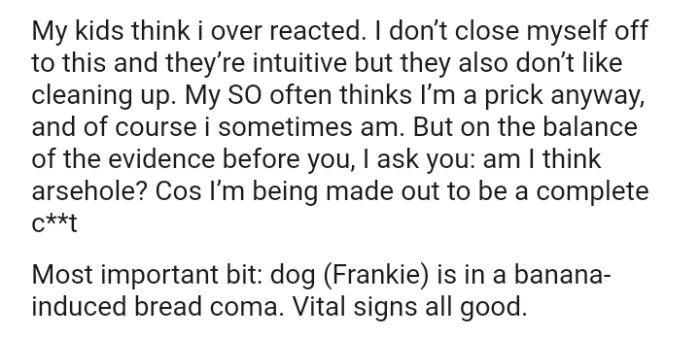
As usual, the comments rolled in, and here are some of the most upvoted ones

The dog only acted like a dog

Research in animal behavior suggests that domesticated dogs can display heightened anxiety or excitement levels when encountering food, particularly if they have previously experienced scarcity. A study published in the Journal of Veterinary Behavior indicates that these behaviors can manifest as overeating, leading to health issues.
Understanding these instincts can help owners manage their pets' diets more effectively and prevent such occurrences.
The Redditor's frustration with the children for leaving the banana bread unattended may reflect deeper issues related to boundaries and responsibility. A study published in the Journal of Applied Animal Welfare Science emphasizes the importance of teaching children about pet care and responsibility from a young age.
When children understand the consequences of their actions, they are more likely to engage in responsible behavior in the future.
That is an absolutely insane idea
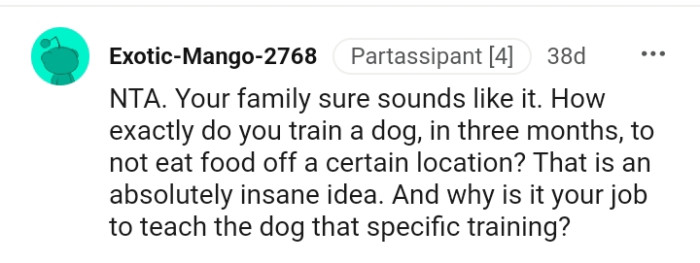
The whole family should be training the dog
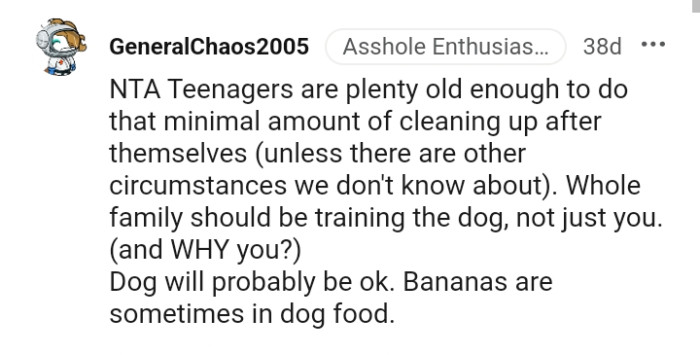
You said something a bit snarky, and the kids were wrong

The Role of Responsibility in Pet Ownership
Pet ownership carries significant responsibilities, including ensuring a safe environment for pets. According to the American Veterinary Medical Association, neglecting to secure food or hazardous items can lead to unintended consequences for pets.
This situation underscores the importance of being proactive in managing a pet's environment to prevent mishaps and promote their well-being.
The Impact of Neglect on Animals
Neglecting a pet's dietary needs can have significant consequences for their health. Research indicates that improper diets can lead to obesity, digestive issues, and other health complications. Understanding these risks is crucial for pet owners who want to ensure their animals live long, healthy lives.
It's essential for owners to recognize that their pets' behavior often reflects the training and care they receive.
The kids lose meals all the time
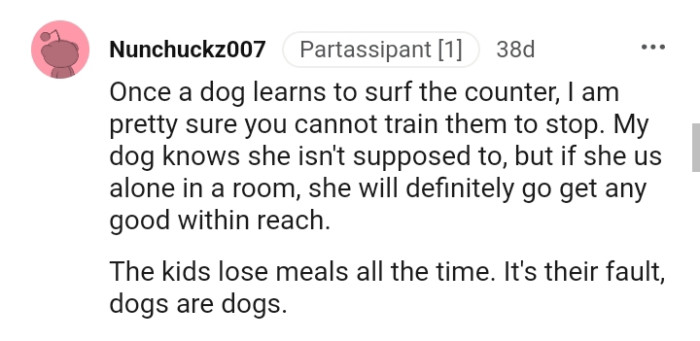
Kids need to be more responsible for their actions
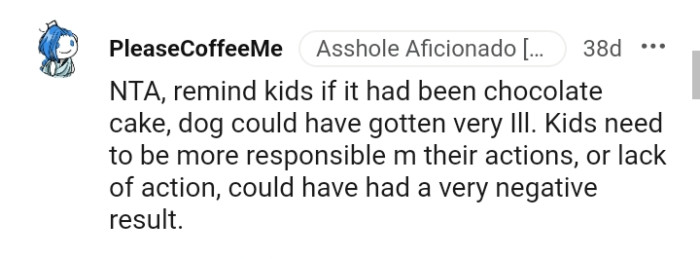
Three months isn't long enough to train a dog
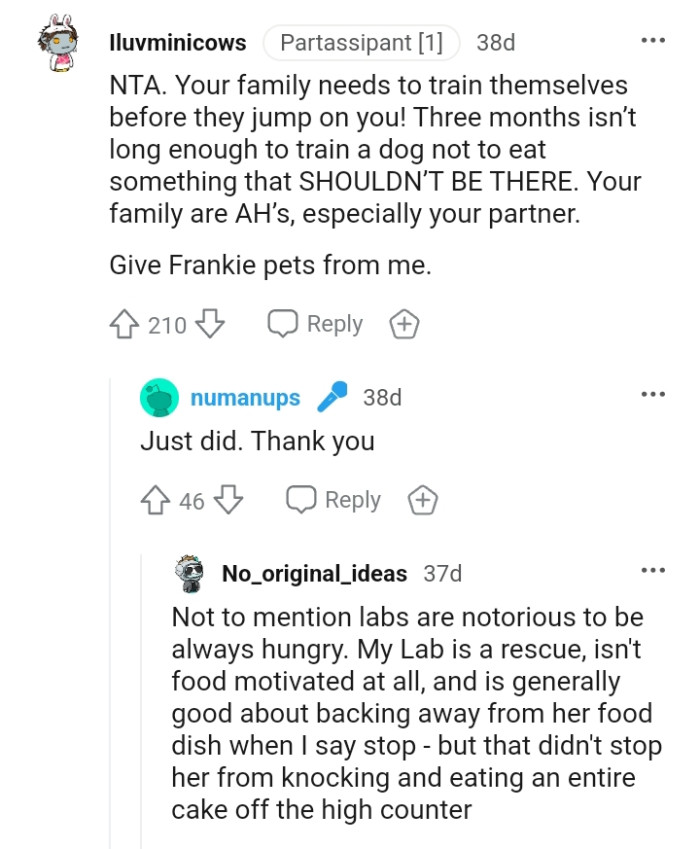
Practical strategies for pet owners include creating designated feeding areas and establishing clear boundaries for pets to reduce the likelihood of overeating. Implementing feeding schedules can also help regulate a pet's diet and prevent health complications.
Training pets to recognize commands related to food can further enhance their understanding of boundaries and expectations.
To mitigate such situations in the future, it may be beneficial for the Redditor to create clear guidelines around food and pet care in the household. Establishing rules about where food can be left unattended and involving children in pet care can foster a sense of responsibility and awareness.
Research supports the idea that involving children in pet care can enhance their empathy and understanding of animal needs, creating a more harmonious household.
They escalated the issue for no reason
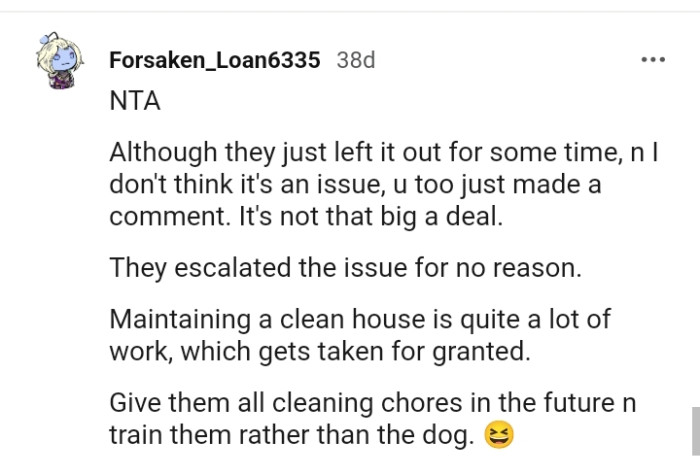
This Redditor is fairly certain that teenagers can do the same

Chocolates are poisonous to dogs
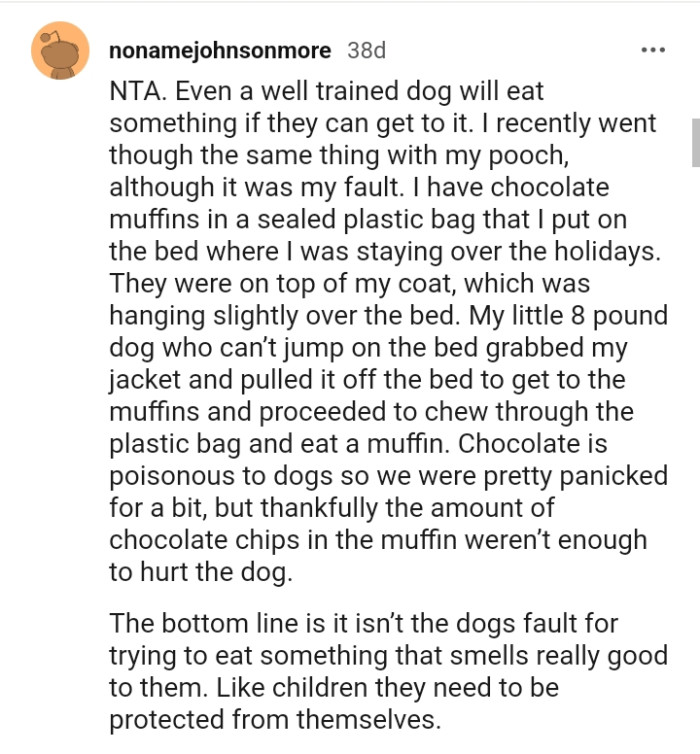
Understanding the Impact of Children on Pets
The presence of children in a household can significantly influence pet behavior. Research in child psychology suggests that children often lack awareness of a pet's needs and boundaries, which can lead to unintended consequences for both the pet and the child.
Understanding this dynamic is essential for fostering a healthy environment for pets and teaching children about responsible pet ownership.
Teaching Children About Responsibility
Educating children about pet care is an essential component of responsible ownership. Dr. Karen Overall, a veterinary behaviorist, emphasizes that teaching children about the needs of pets can foster empathy and reduce neglectful behaviors.
Research shows that children who engage in caring for animals are more likely to develop a sense of responsibility and compassion towards living beings.
The dog only got there three months ago
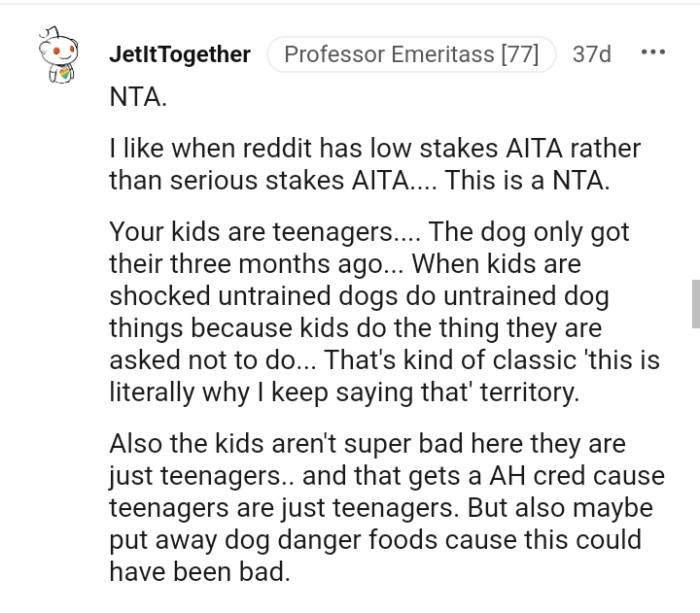
It doesn't sound like your reminder was harsh
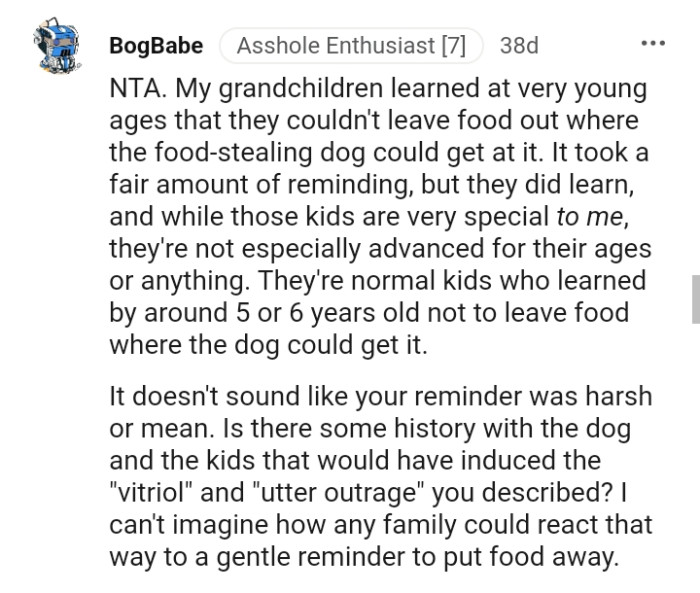
This Redditor would take the blame all day long
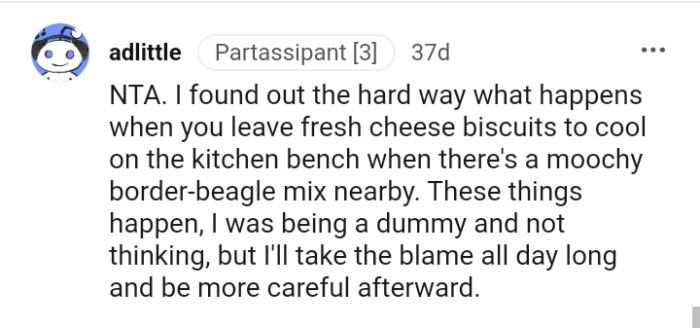
Encouraging children to participate in pet care can be a valuable learning opportunity. Teaching kids about the importance of empathy and responsibility can enhance their relationship with pets and foster respect for animal welfare.
Utilizing games or structured activities can make learning about pet care fun and engaging for children.
Encouraging children to participate in feeding and caring for pets can also create opportunities for bonding. A study published in the Child Development Journal suggests that children who take part in pet care activities often develop stronger emotional connections with their pets.
These experiences can lead to healthier relationships between children and animals while fostering a sense of responsibility.
This Redditor's kids found out the hard way

If the dog sees food it wants, the dog eats it
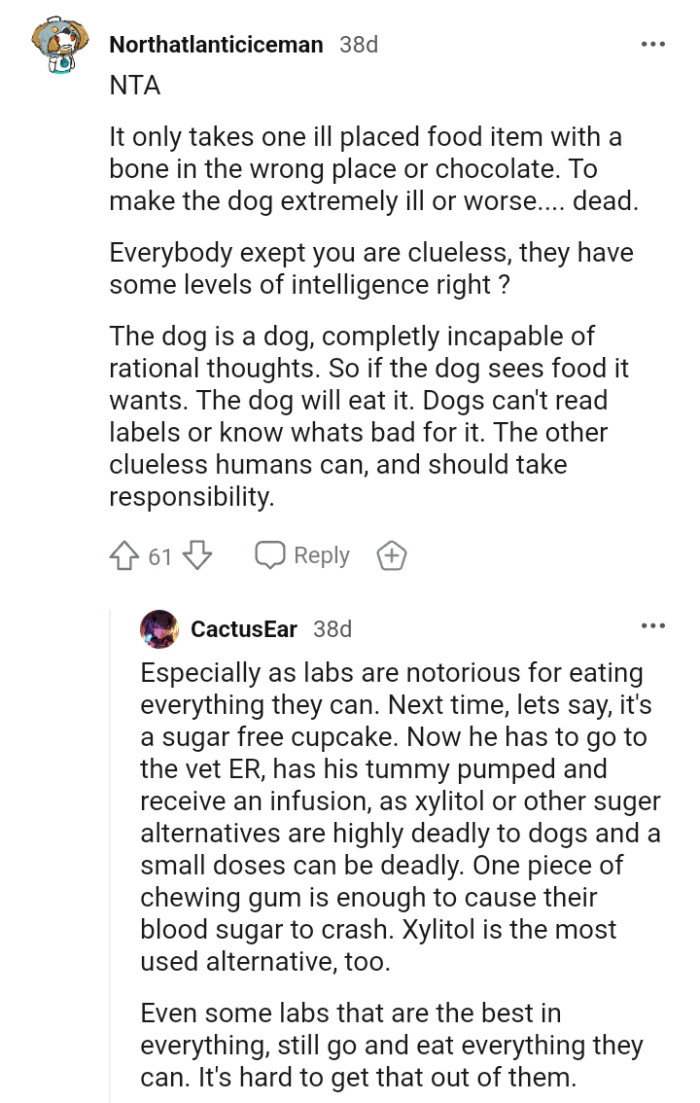
Kids, in general, are careless with snacks and treats
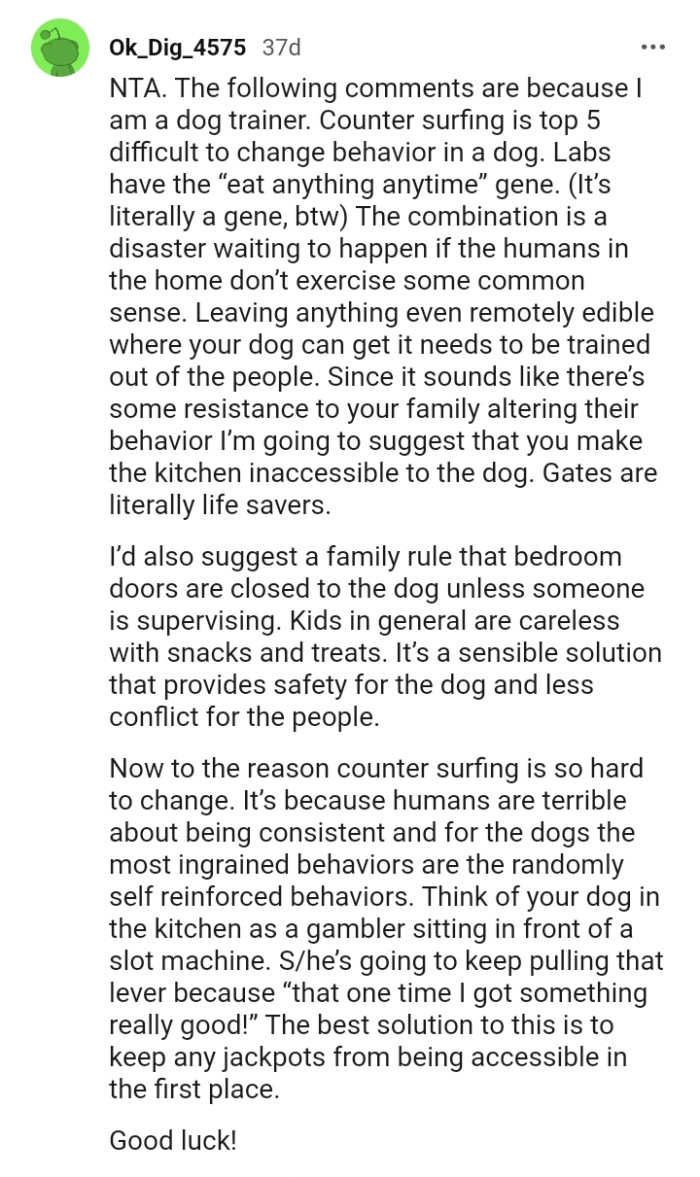
The Importance of Communication in Pet Care
Effective communication between family members is crucial in managing pet care and expectations. Research in family dynamics suggests that discussing roles and responsibilities openly can prevent misunderstandings and promote teamwork.
Setting clear guidelines for pet care can enhance family relationships and ensure that all members are aligned in their approach to caring for the pet.
Establishing Household Rules
Creating a structured environment is essential for both pets and children. Psychologists suggest that establishing clear household rules can help set expectations for behavior and responsibility.
Research indicates that children thrive in structured environments where they understand their roles and the consequences of their actions, ultimately leading to better behavior.
It's hard to train that out of them

Leaving the stuff for you to clean up was immature
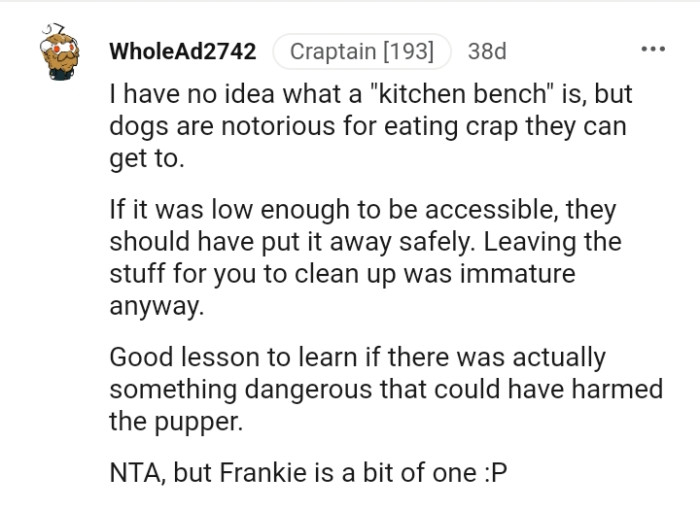
It was the one food she couldn't control herself with
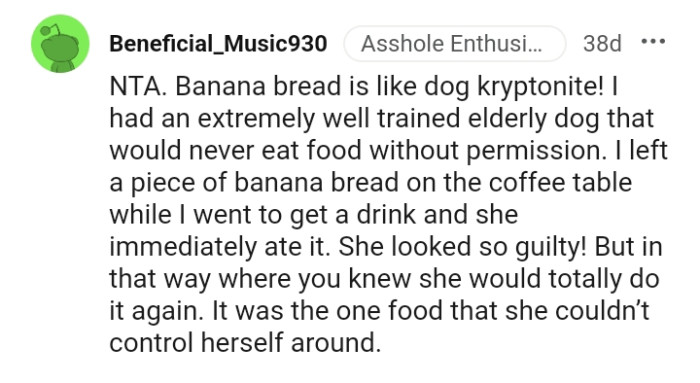
Ultimately, fostering a collaborative approach to pet care can create a more harmonious living environment. Encouraging each family member to take an active role in pet responsibilities can promote a sense of shared ownership and accountability.
This collaborative effort can enhance the overall well-being of both the pet and the family.
In conclusion, addressing the situation with compassion and clear communication can foster a more responsible pet ownership dynamic. By involving children in pet care and establishing guidelines, families can create a healthy environment for both pets and children.
Ultimately, developing these skills early on can lead to more empathetic and responsible adults in the future.
Do you ever feel as though you could pass out at the table after a particularly heavy meal? Whatever you choose to call it—a "food coma" or, more fancifully, "postprandial somnolence"—researchers have finally acknowledged the existence of the phenomenon and may even have identified the foods most likely to cause it.
This is what happened to the OP's dog, but we do hope everything is settled now.
Psychological Analysis
This scenario highlights the complexities of pet ownership and the responsibilities that come with it. The frustration expressed by the Redditor underscores the importance of involving all family members in pet care to prevent neglect and promote understanding.
Encouraging children to take part in these responsibilities can foster empathy and care for animals, leading to healthier pet-owner relationships.
Analysis generated by AI
Analysis & Alternative Approaches
This situation underscores the importance of responsible pet ownership and the role of family dynamics in fostering that responsibility. As research indicates, teaching children about pet care can positively influence their development and relationships with animals.
By creating a structured approach to pet care, families can cultivate empathy and responsibility, ensuring a healthier environment for both pets and their owners.
Analysis & Alternative Approaches
Understanding the dynamics of pet ownership is essential for ensuring the well-being of both pets and families. Research highlights the need for responsible management of pet care and the importance of communication within households.
By fostering collaborative approaches to pet care, families can create a supportive environment that benefits everyone involved, including the pets.



